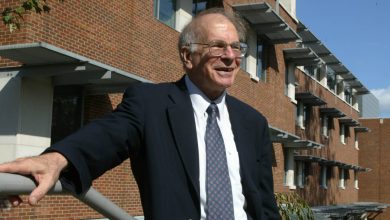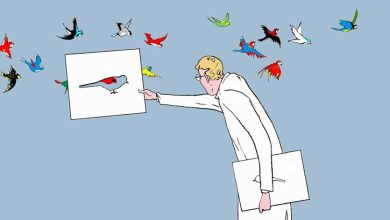Michael Sussmann Is Acquitted in Case Brought by Trump-Era Prosecutor

WASHINGTON — Michael Sussmann, a prominent cybersecurity lawyer with ties to Democrats, was acquitted on Tuesday of a felony charge that he lied to the F.B.I. about having no client in 2016 when he shared a tip about possible connections between Donald J. Trump and Russia.
The verdict was a significant blow to the special counsel, John H. Durham, who was appointed by the Trump administration three years ago to scour the Trump-Russia investigation for any wrongdoing.
The case centered on odd internet data that cybersecurity researchers discovered in 2016 after it became public that Russia had hacked Democrats and Mr. Trump had encouraged the country to target Hillary Clinton’s emails.
The researchers said the data might reflect a covert communications channel using servers for the Trump Organization and Alfa Bank, which has ties to the Kremlin. The F.B.I. briefly looked at the suspicions and dismissed them.
On Sept. 19, 2016, Mr. Sussmann brought those suspicions to a senior F.B.I. official. Prosecutors accused him of falsely telling the official that he was not there on behalf of any client, concealing that he was working for both Mrs. Clinton’s campaign and a technology executive who had given him the tip.
Mr. Durham and prosecutors used court filings and trial testimony to describe how Mr. Sussmann, while working for a Democratic-linked law firm and logging his time to the Clinton campaign, had been trying to get reporters to write about the Alfa Bank suspicions.
But trying to persuade reporters to write about such suspicions is not a crime. Mr. Sussmann’s guilt or innocence turned on a narrow issue: whether he made a false statement to a senior F.B.I. official at the 2016 meeting by saying he was sharing those suspicions on behalf of no one but himself.
Mr. Durham used the case to put forward a larger conspiracy: that there was a joint enterprise to essentially frame Mr. Trump for collusion with Russia by getting the F.B.I. to investigate the suspicions so reporters would write about it. The scheme, Mr. Durham implied, involved the Clinton campaign; its opposition research firm, Fusion GPS; Mr. Sussmann; and a cybersecurity expert who had brought the odd data and analysis to him.
That insinuation thrilled Mr. Trump’s supporters, who share his view that the Russia investigation was a “hoax” and have sought to conflate the inquiry with sometimes dubious accusations. In reality, the Alfa Bank matter was a sideshow: The F.B.I. had already opened its inquiry on other grounds before Mr. Sussmann passed on the tip; the final report by the special counsel, Robert S. Mueller III, made no mention of Alfa Bank.
But the case Mr. Durham and his team used to float their broad insinuations was thin: one count of making a false statement in a meeting with no other witnesses or contemporaneous notes. In a rebuke to the lead prosecutor, Andrew DeFilippis, and his colleagues, the 12 jurors voted unanimously to find Mr. Sussmann not guilty.
Some supporters of Mr. Trump had been bracing for that outcome. They pointed to the District of Columbia’s reputation as a heavily Democratic area and suggested that a jury might be politically biased against a Trump-era prosecutor trying to convict a defendant who was working for the Clinton campaign.
The judge told the jury that they were not to account for their political views when deciding the facts.
Mr. Durham expressed disappointment in the verdict but said he respected the decision by the jury, which deliberated for about six hours.
“I also want to recognize and thank the investigators and the prosecution team for their dedicated efforts in seeking truth and justice in this case,” he said in a statement.
Shortly after the verdict, Mr. Sussmann read a brief statement to reporters outside the courthouse, expressing gratitude to the jury, his defense team and those who supported him and his family during what had been a difficult year. He did not take any questions.
“I told the truth to the F.B.I., and the jury clearly recognized that with their unanimous verdict today,” he said, adding: “Despite being falsely accused, I am relieved that justice ultimately prevailed in this case.”
The defense had argued that Mr. Sussmann brought the matter to the F.B.I. only when he thought The New York Times was on the verge of writing an article about the matter, so that the bureau would not be caught flat-footed.
During the trial, officials for the Clinton campaign testified they had not told or authorized Mr. Sussmann to go to the F.B.I. Doing so was against their interests because they did not trust the bureau, and it could slow down the publication of any article, they said.
James Baker, as the F.B.I.’s general counsel in 2016, met with Mr. Sussmann that September. Mr. Baker testified that he had asked Eric Lichtblau, then a reporter at The New York Times working on the Alfa Bank matter, to slow down so the bureau could have time to investigate it.
The Trump Investigations
Numerous inquiries. Since Donald J. Trump left office, the former president has been facing civil and criminal investigations across the country into his business dealings and political activities. Here is a look at the notable inquiries:
White House documents investigation. The Justice Department has begun a grand jury investigation into the handling of classified materials that ended up at Mr. Trump’s Florida home. The investigation is focused on the discovery by the National Archives that Mr. Trump had taken 15 boxes of documents from the White House to Mar-a-Lago when he left office.
Manhattan criminal case. The Manhattan district attorney’s office has been investigating whether Mr. Trump or his family business, the Trump Organization, intentionally submitted false property values to potential lenders. But new signs have emerged that the inquiry may be losing steam.
New York State civil inquiry. The New York attorney general’s office has been assisting with the Manhattan district attorney’s investigation while conducting its own civil inquiry into some of the same conduct. The civil inquiry is focused on whether Mr. Trump’s statements about the value of his assets were part of a pattern of fraud or were simply Trumpian showmanship.
Georgia criminal inquiry. Mr. Trump himself is under scrutiny in Georgia, where the district attorney of Fulton County has been investigating whether he and others criminally interfered with the 2020 election results in the state. A special investigative grand jury has been seated in the case, and as many as 50 witnesses are expected to be subpoenaed.
Jan. 6 inquiries. A House select committee and federal prosecutors are investigating the Jan. 6 assault on the Capitol and examining the possible culpability of a broad range of figures — including Mr. Trump and his allies — involved in efforts to overturn the results of the 2020 election.
Westchester County criminal investigation. The district attorney’s office in Westchester County, N.Y., appears to be focused at least in part on whether the Trump Organization misled local officials about the value of a golf course, Trump National Golf Club Westchester, to reduce its taxes.
Washington, D.C., lawsuit. The attorney general for the District of Columbia sued Mr. Trump’s inaugural committee, saying it vastly overpaid the Trump Organization for space at the Trump International Hotel during the January 2017 inaugural celebration. The committee and Mr. Trump’s family business later agreed to pay $750,000 to settle the lawsuit.
At the trial, Mr. Sussmann’s defense team offered the jurors many potential paths to acquittal, contending that the prosecution had yet to prove beyond a reasonable doubt.
They attacked as doubtful whether Mr. Sussmann actually uttered the words that he had no client at his meeting with the F.B.I. in September.
That issue was complicated after a text message came to light in which Mr. Sussmann, arranging for the meeting a day earlier, indicated that he was reaching out on his own. But it was what, if anything, he said at the meeting itself that was at issue.
Mr. Baker testified on the stand that he was “100 percent” certain that Mr. Sussmann repeated those words to his face. But defense lawyers pointed out that he had recalled the meeting differently on many other occasions.
The defense team also argued that Mr. Sussmann was in fact not there on behalf of any client, even though he had clients with an interest in the topic. And they questioned whether it mattered, since the F.B.I. knew he represented the Democratic National Committee and the Clinton campaign on other issues, and agents would have investigated the allegations regardless.
Midmorning on Friday, the jury asked to see a trial exhibit meant to bolster the defense’s argument that Mr. Sussmann did not consider himself to be representing the Clinton campaign. It was a record of taxi rides Mr. Sussmann expensed for the meeting at F.B.I. headquarters.
He logged those rides to the firm rather than to the Clinton campaign or to a technology executive, Rodney Joffe, who had worked with the data scientists who developed the suspicions and brought them to Mr. Sussmann. Prosecutors asserted that Mr. Joffe was his other hidden client in the meeting.
During the trial, prosecutors had made much of how Mr. Sussmann logged extensive hours on the Alfa Bank matter to the Clinton campaign in law firm billing records — including phone calls and meetings with reporters and with his partner at the time, Marc Elias, the general counsel of the Clinton campaign.
Defense lawyers acknowledged that the Clinton campaign had been Mr. Sussmann’s client for the purpose of trying to persuade reporters to write about the matter, but argued that he was working for no one when he brought the same materials to the F.B.I.
In a statement, Sean Berkowitz and Michael Bosworth, two of Mr. Sussmann’s defense lawyers, criticized Mr. Durham for bringing the indictment.
“Michael Sussmann should never have been charged in the first place,” they said. “This is a case of extraordinary prosecutorial overreach. And we believe that today’s verdict sends an unmistakable message to anyone who cares to listen: Politics is no substitute for evidence, and politics has no place in our system of justice.”





